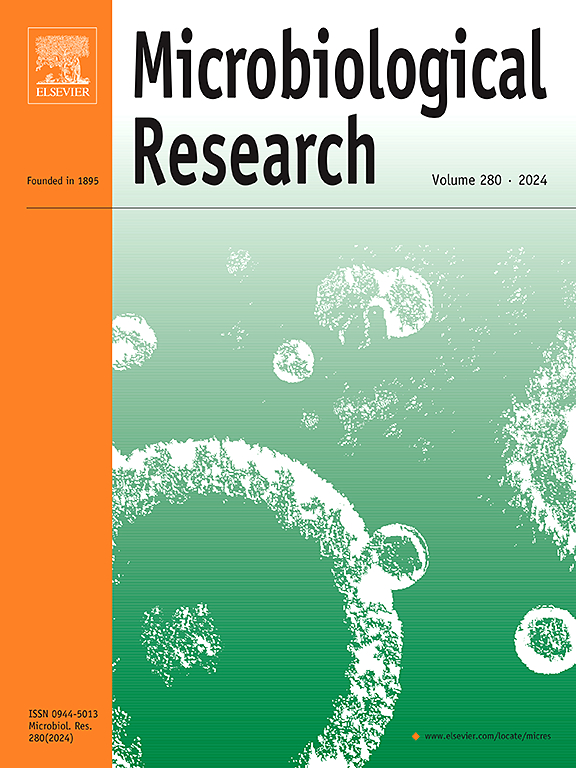台湾乳球菌及其代谢物4-乙酰氨基丁酸诱导难固性功能性便秘患者半胱天冬酶-11依赖性肌内神经元焦凋亡
IF 6.9
1区 生物学
Q1 MICROBIOLOGY
引用次数: 0
摘要
顽固性功能性便秘(IFC)是一种严重的慢性便秘形式,其特点是转运缓慢且对常规治疗有耐药性,是一项重大的临床挑战。在这里,我们发现台湾乳球菌(Lf),一种在IFC患者中普遍存在的革兰氏阳性细菌,作为肠道运动障碍的新贡献者。在临床上,IFC患者表现出结肠粘膜Lf定植增加和明显的肌肠神经元丢失和焦亡,特别是在兴奋性胆碱乙酰转移酶(ChAT)+神经元中,但没有抑制性神经元一氧化氮合酶(nNOS)+神经元。在小鼠中,Lf及其上清液损害肠道运动,减少粪便含水量,延长运输时间,抑制离体肠段的自发收缩和最大收缩力。RNA测序显示,Lf破坏神经化学信号,暗示其致病作用中的神经元损伤。在机制上,Lf及其上清通过caspase-1激活选择性诱导ChAT+神经元焦亡。代谢组学分析发现,4-乙酰氨基丁酸(4-ABA)是Lf上清液和IFC患者粪便共享的关键代谢物。4-ABA通过caspase-11依赖性途径诱导ChAT+神经元焦亡,进一步损害肠道运动能力,这在Casp11(毒血症)/⁻(毒血症)中得到证实。本研究揭示了IFC中单一微生物群诱导的神经元损伤的一个以前未被认识的途径,并为针对肠道微生物群- ens相互作用的新型诊断和治疗策略提供了基础本文章由计算机程序翻译,如有差异,请以英文原文为准。
Lactococcus formosensis and its metabolite 4-acetamidobutanoic acid induced caspase-11 dependent myenteric neuronal pyroptosis in intractable functional constipation
Intractable functional constipation (IFC), a severe form of chronic constipation characterized by slow transit and resistance to conventional treatments, posed a significant clinical challenge. Here, we identified Lactococcus formosensis (Lf), a Gram-positive bacterium prevalent in IFC patients, as a novel contributor to intestinal motility impairment. Clinically, IFC patients exhibited increased colonic mucosal colonization of Lf and significant myenteric neuronal loss and pyroptosis, particularly in excitatory choline acetyltransferase (ChAT)+ neurons, but not inhibitory neuronal nitric oxide synthase (nNOS)+ neurons. In mice, Lf and its supernatant impaired intestinal motility, reducing fecal water content, prolonging transit times, and inhibiting spontaneous contractions and maximum contractile force in isolated intestinal segments. RNA sequencing revealed that Lf disrupted neurochemical signaling, implicating neuronal damage in its pathogenic effects. Mechanistically, Lf and its supernatant selectively induced pyroptosis in ChAT+ neurons via caspase-1 activation. Metabolomic profiling identified 4-acetamidobutanoic acid (4-ABA) as a key metabolite shared between Lf supernatant and IFC patient feces. 4-ABA induced ChAT+ neuronal pyroptosis through a caspase-11-dependent pathway, further impairing intestinal motility, which was confirmed in Casp11⁻/⁻ mice. This study uncovered a previously unrecognized pathway of single microbiota-induced neuronal damage in IFC and provided a foundation for novel diagnostic and therapeutic strategies targeting gut microbiota-ENS interactions
求助全文
通过发布文献求助,成功后即可免费获取论文全文。
去求助
来源期刊

Microbiological research
生物-微生物学
CiteScore
10.90
自引率
6.00%
发文量
249
审稿时长
29 days
期刊介绍:
Microbiological Research is devoted to publishing reports on prokaryotic and eukaryotic microorganisms such as yeasts, fungi, bacteria, archaea, and protozoa. Research on interactions between pathogenic microorganisms and their environment or hosts are also covered.
 求助内容:
求助内容: 应助结果提醒方式:
应助结果提醒方式:


